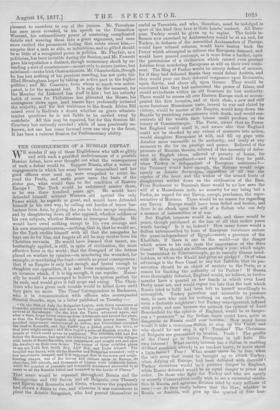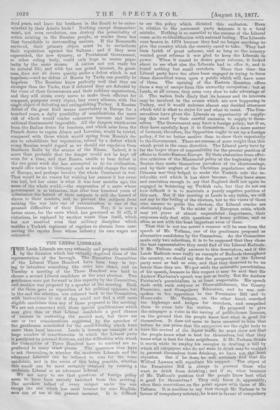THE CONSEQUENCES OF A RUSSIAN DEFEAT.
WE wonder if any of those Englishmen who talk so glibly and with such a gratified maliciousness of a possible Russian defeat, have ever thought out what the consequences of such a defeat would be. Suppose Russia, after a series of engagements in which her army became demoralised and her good officers were used up, were compelled to retire be- yond the Pruth, and make peace upon the basis of the status quo, what would then be the condition of Eastern Europe I The Turk would be unfettered master there, status quo, what would then be the condition of Eastern Europe I The Turk would be unfettered master there, as he was three hundred years ago. He would have defended himself without Western aid against the only Power which he regards as great, and would have defended himself in his own way, by calling out hordes of brave bar- barians from Asia, by giving the rein to their savage impulses, and by slaughtering down all who opposed, whether soldiers or his own subjects, whether Russians or insurgent Rayahs. Ho would have owed nothing except to his own courage and his own unscrupulousness,—nothing, that is, that he would see, for the Turk credits himself with all that the renegades he buys can do for him, and forgets all aid he may receive from his Christian servants. He would have learned that terror, un- hesitatingly applied, is still, in spite of civilisation, the most effective force in the world ; that the disregard of the fetters placed on warfare by opinion—in murdering the wounded, for example, or mutilating the dead—entails no penal consequences ; that if an Empire is only bad enough and brutal enough to slaughter out opposition, it is safe from resistance, except by an invasion which, if it is big enough, it can repulse. Natur- ally he would be encouraged to believe his system perfect for its ends, and would' give it full scope and swing. The Chris- tians who have given such. trouble would be killed down until they gave no more. The Times' Correspondent at Bucharest, who is in communication with officers who accompanied General Gourko, says, in a letter published on Tuesday :- " On the 29th of July the Bulgarian Legion, with three squadrons of Cossacks, pushed forward, and drove back the opposing Turks till they arrived at Karabunar. On the 91st the Turks advanced again, and after a time, large fames came up from Adrianople and turned the place, so that the Bulgarian Legion only escaped with heavy losses. The terrified inhabitants endeavoured to follow, but Cireassians occupied the road to Kezanlik, and the Turks set a guard round the town, so that none might escape ; and then began a scene of fiendish cruelty, the details of which could never be published. The notables, wh'e had fled before the Russians, bad spent the interval in the neighbouring villages with bands of Bashi-Bazouks, now reappeared, and sought out and slew the dwellers on their own farms. The names of these notables given to mo are Teflk Bey, Sodik Boy, Akif Bey, and papa Ahmed. The hospital was burnt, with all the Russian and Bulgarian wounded ; only a few inhabitants escaped, and it is supposed that in the town and neigh- bouring vilayet, one of the fairest and richest spots in Europe, 80 churches, 500 schools, and thousands of houses wore ruthlessly burnt, while the number of peasants and townsfolk massacred amounted to as many as all the Russian killed and wounded in the battle of Plevna."
That scene would be repeated throughout Bosnia and the Herzegovina and Old Servia and all Bulgaria, over Thessaly and Epirus and Roumelia and Crete, wherever the population had shown a desire to rise, and wherever it was convenient to plant the Asiatic Irregulars, who had proved themselves so useful as Terrorists, and who, therefore, must be indulged in sport of the •kind they love to their hearts' content. All Euro- pean Turkey would be given up to rapine. The feeble in- fluence now exercised by Ambassadors would be at an end, for Turkey, in defiance of the assembled Ambassadors of Europe, would have refused reforms, would have beaten back the Power which attempted to enforce the European demand, and i would have poured contempt, as it were from a bucket, upon the pretensions of a civilisation which cannot even prevent Asiatics from murdering Europeans at will on their own conti- nent. The Ring of Pashas would be utterly defiant of menace, for if they had defeated Russia they could defeat Austria, and they would pour out their deferred vengeance upon Roumania, upon Servia, and above all, upon Greece. They would be convinced that they had underrated the power of Islam, and would revindicate within its old frontiers its lost authority. There would be scenes all over Eastern Europe such as accom- panied the first invasion, and at their close, a new and stilt i
more ferocious Mussulman caste, inured to war and elated by victory, would be master of the Empire, would keep down the Rayahs by punishing remonstrance with death, and would con- centrate all the wealth their labour could produce on the luxury of Constantinople. The Porte, aware that no Power but England could assail it, and aware also that England could not be shocked by any extent of massacre into action, would slaughter Europeans at will, and fill up gaps with Asiatics more amenable to its authority, and ready at any moment to die for its prestige and power. Relieved of the, pressure of Russian threats, relieved of the necessity of defer- ence to English ideas, relieved of poverty at home, for with all debts repudiated—and why should they be paid, when Turkey is independent of European assistance ?- the Treasury would have enough, the Sultans would reign openly as Asiatic Sovereigns, regardless of all but the caprice of the hour, and the wishes of the armed hosts of slaughterers settled down on the civilisation of the East, From Bucharest to Bussorah there would be no law save the will of a Mussulman mob, no security for any being but a Pasha, no regard for any Envoy, except, perchance, the repre- sentative of Morocco. There would be no reason for regarding any Envoy. Europe would have been defied and beaten, and there is no check upon the will of a Sultan who can defy a menace of insurrection or of war.
But English interests would be safe, and there would be peace, though purchased at the loss of all that makes peace worth having? Is it so, indeed ? How many hours would a Sultan untrammelled by fears of European resistance endure the quasi-independence of Egypt—surely a province of the Khalifate, if there is one in the world—or the danger which arises to his rule from the importance of the Suez Canal ? Why should six millions sterling a year, which might be transmitted to Constantinople, go to rascally Giaour bond- holders, to whom the Khalif had given no pledge ? Or of what advantage is the Suez Canal to any but Infidels, that its pre- servation should be an object. of anxiety to the Porte, or a reason for limiting the authority of its Pashas ? If Russia were thoroughly defeated, England would, we believe, in twelve months have a quarrel on her hands in which even Lord Derby must act, and would regret too late that the task which Russia tried to fulfil had been left to herself unwillingly to accomplish. Turkey powerless and amenable to pressure. may, to men who care for nothing on earth but dividends, seem a desirable neighbour ; but Turkey reinvigorated, inflated with pride, and sore because she mistook the opinion of Lord; Beaconsfield for the opinion of England, would be as danger- ous a " protector" as the Indian route could have, quite as dangerous as Russia could over become. How many hours would it take a victorious Sultan to stop up the Canal, and why should he not stop it up ? Treaties ? The Christians of Bulgaria are guaranteed by treaties. Profit ? The profits of the Canal go to fatten Europeans in tall hats. His
i
own interest? What earthly interest has a Sultan in enabling civilised mankind, already in an insolent hurry, to move about a little faster ? Fear ? What would there be to fear, when the only army that could be brought up to attack Turkey, when defying all Europe, had been defeated with discredit ? Turkey victorious would bo a positive danger to England, while Russia defeated would be an equal danger to peace and order. Do those who fight for Turkey and who are openly or secretly Conservatives really wish to see a successful revolu- tion in Russia, and agrarian division tried by sixty millions of men ?—or do they really believe that the Slav, whether in Russia or Austria, will give up the quarrel of four him-
dred years, and leave his brethren in the South to be exter- minated by their Asiatic lords I Nothing except dismember- ment, not even revolution, can destroy the potentiality of action existing in the Russian people, or render them less than formidable to surrounding nations. If the Romanoffs survived, their primary object must be to revindicate their reputation against the Sultans ; and if they were superseded, the new dynasty, or Provisional Government, or other ruling body, could only hope to secure popu- larity by the same means. A nation not yet ready for its natural life, and with but one grand interest, its great- ness, does not sit down quietly under a defeat which is not hopeless,—and no defeat of Russia by Turks can possibly be hopeless. The Russians know perfectly well that they are stronger than the Turks, that if defeated they are defeated by the vices of their Government and their military organisation, and they will strain every nerve to make them efficient for conquest, postpone every object, buy every alliance, with the single object of defeating and extinguishing Turkey. A Russian defeat .of the great kind means uncertainty in Europe for a hundred years, a daily possibility of combinations the mere risk of which would render commerce insecure and inter- national disarmament impossible. All the dangers which arose from the Italian desire for freedom, and which arise from the French desire to regain Alsace and Lorraine, would be trivial, compared with those which would spring from Russia's de- sire to rehabilitate her reputation, ruined by a defeat which every Russian would regard as we should our expulsion from Southern India by the armies of the Nizam. Indeed, it is more than probable that the danger would not be kept off even for a time, and that Russia, unable to bear defeat in the one great work she has attempted to do for civilisation, would offer terms to Germany such as would change the map of Europe, and perhaps involve the whole Continent in war. That would be no reason for wishing her success if her cause was bad, but her cause is what it was four months ago, the
• 161180 of the whole world,—the suppression of a caste whose government is so infamous, that after four hundred years of submission the hatred of their subjects is still the hatred of slaves to their masters, and to prevent the subjects from turning the war into one of extermination is one of the greatest difficulties of their liberators. Nay, it is now a better cause, for the caste which has governed so ill will, if victorious, be replaced by another worse than itself, which has not received even that military discipline which enables a Turkish regiment of regulars to abstain from mas- sacring the rayahs from whose industry its own wages are extracted.



































 Previous page
Previous page